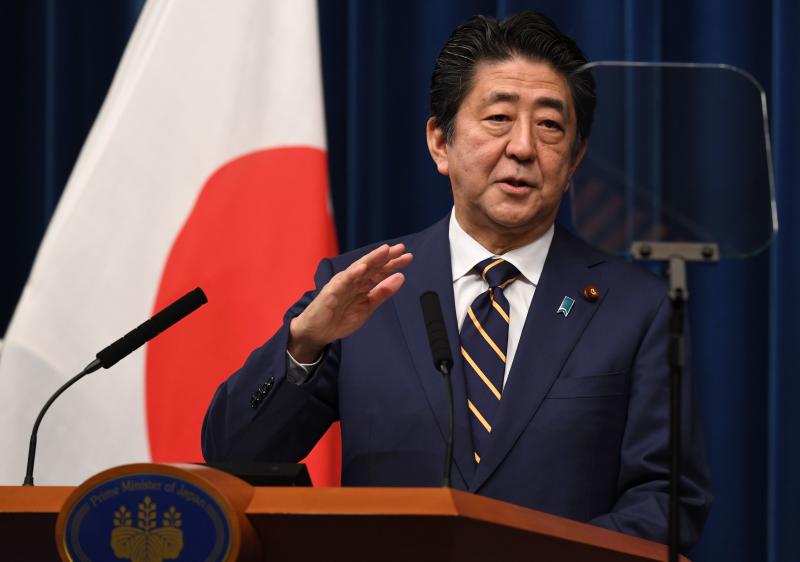Abe to ignore controversial Okinawa referendum on US base move
Sign up now: Get insights on Asia's fast-moving developments

Japanese Prime Minister Shinzo Abe has said his government would ignore a referendum on the re-location of the US Marine Corps Air Station Futenma in densely populated Ginowan to the coastal district of Henoko.
PHOTO: AFP
TOKYO - Okinawa residents will vote in a controversial referendum in the prefecture on Sunday (Feb 24) on the re-location of a key American air base, a non-binding poll whose result Prime Minister Shinzo Abe has said his government would ignore.
About 1.16 million people aged 18 and above are eligible to cast their ballots, as a decades-long impasse comes to a head over the plan to move the US Marine Corps Air Station Futenma in densely populated Ginowan to the coastal district of Henoko.
The central government, which has even resorted to taking the Okinawa government to court to force the move, has gone ahead and restarted long-stalled land reclamation work off Henoko despite massive local opposition and protests.
The base issue has long been an irritant to the US-Japan security alliance.
Voters will have three options: yes, no, or neither. The "neither" option was only added after five of Okinawa's 41 municipalities, led by the ruling Liberal Democratic Party (LDP), said they would not take part in the referendum if it was merely a binary vote.
Okinawans are expected to overwhelmingly reject the base move. A Kyodo News survey last week showed that 67.7 per cent of residents planned to vote "no", while another Asahi Shimbun survey showed 59 per cent intended to do so.
The two-hour detention of a Japanese-American man, who has roots with Okinawa, upon his arrival at Kansai International Airport on Tuesday (Feb 19) added to the controversy.
Mr Robert Kajiwara, 32, a Hawaii-based composer, was behind an online petition to urge US President Donald Trump to stop the land fill work. It gathered more than 200,000 signatures in a month.
Immigration officials said Mr Kajiwara's repeated visits had led to a routine interrogation, insisting that they had "no particular agenda" in the detention.
With the East and South China Seas in its backyard, Okinawa is seen as strategically important to the US-Japan security alliance. Okinawa, too, administers the disputed Senkaku/Diaoyu islets in the East China Sea that are also claimed by China, which has been making regular encroachments into Japanese waters.
Okinawa Governor Denny Tamaki, who was elected by an overwhelming margin last year on an anti-base platform, has travelled to New York and Washington to lobby against the move. Sunday's vote, he said, was a "very significant opportunity for Okinawa residents to directly show their will".
Futenma has been billed as the "most dangerous base in the world", given its location in a densely-populated area. Okinawa residents have also been incensed by several high-profile crimes, not least the gang rape and abduction of a 12-year-old girl by three US soldiers in 1995. In 2017, a US civilian base worker was jailed for life for the 2016 rape and murder of a local woman. The same year, a 21-year-old US Marine, who was highly intoxicated, killed a 61-year-old man in a car accident.
Safety is another big concern. In December 2017, a window from a US CH-53E helicopter fell onto the playground of an Okinawa school, injuring a 10-year-old boy. The school said it has ordered pupils indoors 693 times in the year since the incident as a safety precaution.
But the Henoko site, too, has its detractors given the need for land reclamation. Critics say the works will damage a delicate marine ecosystem that is home to the endangered dugong and rare coral reefs.
Tokyo has said it plans to drive nearly 77,000 piles of sand into the seabed to raise the soft ground, in what Chief Cabinet Secretary Yoshihide Suga touted as a "conventional construction method".
Neither site is palatable to Okinawa residents. But in trying to stall the Henoko relocation, they want to force Tokyo's hand to agree to move the base out of Okinawa altogether.
Okinawa, whose sovereignty was only returned to Japan in 1972 after decades of US administration since the end of the Second World War, has long been upset by what it sees as an unfair military burden. While it only accounts for 0.6 per cent of Japan's total land area, it hosts about 70 per cent of the total US base area in Japan and more than half of the US military's 47,000 personnel in the country.
Mr Abe told Parliament on Wednesday (Feb 20) that the government would proceed with reclamation works. He added: "We are proceeding with the transfer of drills conducted at Futenma to locations outside the prefecture. We will continue to put all our efforts into reducing the burden on Okinawa."
Meanwhile, in an editorial last Friday (Feb 15), the pro-government Yomiuri daily called Mr Tamaki "irresponsible" for not having presented any realistic alternative to the Henoko relocation.
It said: "Without being swayed by referendum results, the central government needs to go ahead with reclamation and bank protection work in a businesslike manner while weighing safety aspects."
Kobe University security expert Tosh Minohara said that Okinawa's strategic importance is "self-explanatory" given the key threats of China and North Korea.
"It will turn ugly if Okinawans say no and vote resoundingly against the relocation," he said. "By forcing the issue, Tokyo will in a way look very undemocratic."


